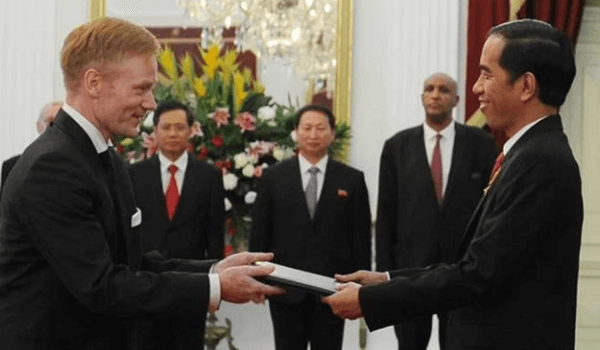The end of 2014 marked the beginning of a change of government for both Indonesia and the European Union. We saw the election of Joko Widodo to the Presidency in October, followed by the election of Jean-Claude Juncker as President of the European Commission and Donald Tusk as the President of the European Council. There were two major political developments in the media coverage that affected EU-Indonesia relations over the past year; the mass executions of international drug convicts as well as the Indonesian government’s request for Schengen visa waiver for its citizens.
Under President Joko Widodo, Indonesia saw its four-year moratorium on death penalty lifted as it resumed executions. In April, the executions of drug convicts from Australia, Nigeria, Ghana, the Philippines and Brazil generated headlines all over the world. Serge Atlaoui, a French citizen was due to be executed alongside the other drug convicts, but won a last-minute temporary reprieve.
Spurred by its principled opposition to the death penalty and promotion of worldwide abolition, EU clearly spoke out against Indonesia’s execution of drug convicts. EU, along with Australia and France whose citizens were among the people condemned to death, appealed the Indonesian government to spare the lives of the convicts. EU, through its High Representative for Foreign Affairs, stated that it recognised Indonesia’s efforts to combat drugs and is willing to offer assistance but insisted that the death penalty is not the answer. Furthermore, condemnation from other European countries as well as international institutions with a strong principled opposition to the death penalty was nearly unanimous. Their appeal ultimately failed as Widodo’s administration went ahead with the execution. Nevertheless, France reaffirmed its commitment to maintaining a close relationship with Indonesia despite the possible execution of Mr. Atlaoui. French Ambassador to Indonesia Corinne Breuzé acknowledged the ongoing legal process but reiterated French-Indonesian cooperation on many issues of mutual interest including in the field of science and education, coastal and coral ecosystem protection, as well as environment and climate change.
The entire debate on the executions were portrayed highly emotively by the media. Europe’s vigorous opposition to the death penalty has in part propelled the Western media’s condemnation of the executions while the general Indonesian media played to a more nationalist and self-justifying rhetoric on the executions. However, despite multiple warnings that there would be diplomatic repercussions following the executions, it seems that in the long term Widodo’s administration have not been sullied in their undertaking of affairs with the European Union and Australia. In a sign of maturing bilateral relations, the uproar over the sentencing of death penalties ultimately did little to damage the overall EU-Indonesian relationship.
On July 2015, Indonesia launched a formal request for a visa waiver for short visits to the Schengen area through Frans Timmermans, First Vice President of the European Commission and Federica Mogherini, EU’s High Representative for Foreign Affairs. The request was received positively by Timmermans and Mogherini, considering that around 150,000 Indonesian tourists visit the Schengen area every year and that the visa rejection rate was negligible at 1.1%. Moreover, Indonesia has waived visa requirement for tourists from the EU since 1 October 2015. This proposal was further discussed in the bilateral meeting between Foreign Minister Retno Marsudi and her counterpart Mogherini on the sidelines of the 12th ASEM Foreign Ministers Meeting in Luxembourg. Currently, the visa waiver request has been sent to the European Commission and will be further reviewed by the European Council in 2016.
Besides requesting the visa waiver proposal through the European Union, the Indonesian government has also attempted to shore up support from member countries within the Schengen area. The Schengen area consists of 22 EU member states and four non-EU member states, namely Iceland, Liechtenstein, Norway and Switzerland. While the Romanian government was initially reluctant to support the proposal, the visa waiver request is generally supported by other Schengen countries including France, Belgium and the Netherlands. France’s support was delivered by its Foreign Minister Laurent Fabius during the 70th UN General Assembly in New York. While Belgium’s support was conveyed by Patrick Hermann, the Belgian Ambassador to Indonesia. Ambassador Hermann stated that he was confident an agreement on the visa waiver would be reached soon and saw this momentum as a stepping stone to strengthen cooperation between Indonesia and European Union in the future.
Author: Endy Wirawan and Rizka Cantika Anggara.
Both are undergraduate students in the Department of International Relations Universitas Gadjah Mada, and currently work as research assistants for the media research on Indonesia-European Union bilateral relations in 2015 at the Programme on European Studies, Institute of International Studies.

